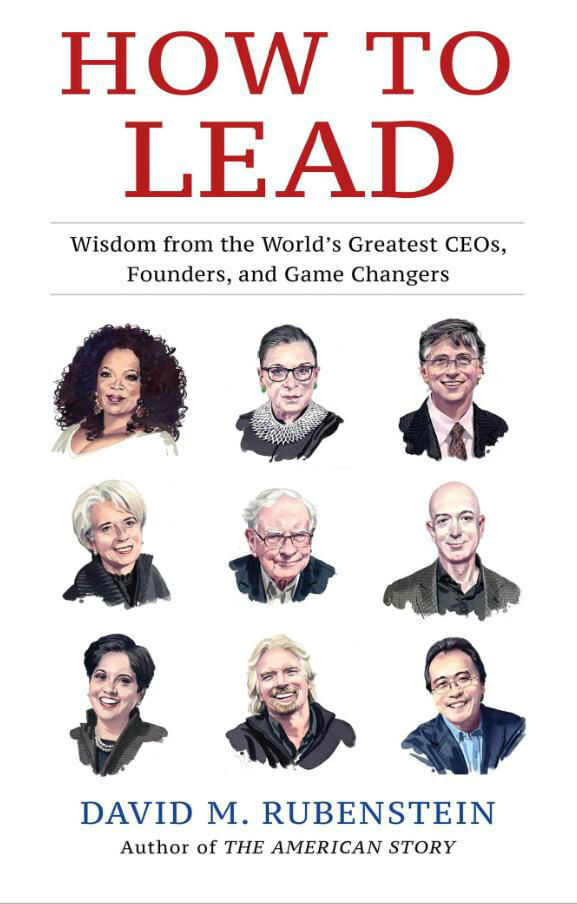Book review: ‘How to Lead’
Published 12:00 am Sunday, October 4, 2020

- BOOK REVIEW
“How to Lead: Wisdom from the World’s Greatest CEOs, Founders, and Game Changers” by David M. Rubenstein. New York: Simon & Schuster, 2020. 448 pages, $30 (hardcover).
“I have always been fascinated with leadership – specifically what individual leaders can accomplish by the power of their intellect, level of their unique skill, force of their personality, or effectiveness of their ability to persuade,” David M. Rubenstein explains near the beginning of “How to Lead: Wisdom from the World’s Greatest CEOs, Founders, and Game Changers,” his comprehensive exploration of what sets our best leaders apart from their peers. “I have written ‘How to Lead’ because I care a good deal about the positive impact that strong, decisive and talented leaders can bring to a society.
Trending
“But I did not honestly feel that my own specific leadership story was sufficient to inspire others,” the author continues. “I felt that the story of really extraordinary leaders, as told through frank interviews, would be far more helpful. In each of the interviews on this book, I have tried to ask the interviewee about how he or she became and remains a leader. My hope is that readers will recognize that leadership has its challenges, and mere interest in being a leader is not enough. But those from any background can become leaders – and strong leaders can make some part of the world a better place.”
So begins a mesmerizing and extraordinarily enlightening foray into a topic that has fascinated human beings since the dawn of civilization. History is literally the story of how leaders have advanced the collective narrative from the tribal era right up to the modern global community. Definitions come and go, and characteristics inherently evolve in response to societal norms and intervening circumstances. But, after making my way through this exhaustive investigation of leadership in a variety of different and still-emerging contexts, Rubenstein’s central thesis becomes crystal clear: There are certain defining characteristics that seem to be indigenous to all leaders who have been exceptionally successful in their chosen pursuit. More on those later.
Structurally, the tome (and clocking in at 448 pages, I believe it qualifies for that distinction), consists of a brief introduction and then an in-depth verbatim interview with 30 leaders (George W. Bush and Bill Clinton are interviewed together in the same chapter). Rubenstein organized the manuscript into six major sections: “Visionaries (Jeff Bezos, Bill Gates, Richard Branson, Oprah Winfrey and Warren Buffet),” “Builders (Phil Knight, Ken Griffin, Robert F. Smith, Jamie Dimon and Marillyn Hewson),” “Transformers (Melinda Gates, Eric Schmidt, Tim Cook, Ginni Rometty and Indra Nooyi),” “Commanders (George W. Bush and William J. Clinton, Colin Powell, David Petraeus, Condoleezza Rice and James A. Baker III),” Decision-Makers (Nancy Pelosi, Adam Silver, Christine Lagarde and Ruth Bader Ginsburg)” and “Masters (Jack Nicklaus, Mike “Coach K” Krzyzewski, Renee Fleming, Yo-Yo-Ma and Lorne Michaels).” Essentially, Rubenstein sets the stage for each encounter and then provides a transcript of the questions he asks and the responses he gets from each participant.
As usual, when I approach a book with this kind of agenda, I am naturally drawn to the challenges truly great leaders always seem to have had to overcome as they slowly but methodically ascended the heights to which they aspired and eventually achieved. Such was the case with Rubenstein’s interview with Ginsburg, who was an associate justice of the U.S. Supreme Court before her death last month. Witness the following question and response from her interview, which took place on Sept. 19, 2019:
“David Rubenstein: You went to Columbia Law School, and your law degree is from Columbia. You did extremely well there. You were on the law review there as well. Having been on the ‘Harvard Law Review’ and the ‘Columbia Law Review,’ you were flooded with job offers from the major law firms?”
“Ruth Bader Ginsburg: There wasn’t a single firm in the entire city of New York that would take a chance on me. I have said I had three strikes against me. One, I was Jewish, and the Wall Street firms were just beginning to welcome Jews. Then I was a woman. But the absolute killer – I was a mother. My daughter was 4 years old when I graduated from law school. Employers who might take a chance on a woman were not prepared to take a chance on a mother.”
Trending
Good thing she was not deterred by her initial lack of acceptance. A little later in the interview:
“Rubenstein: What gives you the most hope for the future?”
“Ginsburg: My granddaughters. I’m very proud of my eldest granddaughter, who is a lawyer. She cares a great deal about our country, and about its highest values. She and other young people like her will help us get back on track.”
I tend to agree. The current generation doesn’t seem at all interested in resolving the conflict that has our nation paralyzed, nor does it seem overly invested in solving the myriad problems we currently face.
Co-founder and co-executive chairman of The Carlyle Group, one of the world’s largest and most successful private equity firms, Rubenstein is also chairman of the boards of trustees for the John F. Kennedy Center for the Performing Arts and the Council on Foreign Relations. An original signer of the Giving Pledge and a recipient of the Carnegie Medal of Philanthropy as well as the National Humanities Medal, he also hosts “The David Rubenstein Show: Peer to Peer Conversations” on Bloomberg TV and PBS. He has degrees from Duke University and the University of Chicago Law School. This is his second book, the first being “The American Story: Conversations with Master Historians,” which was published last year.
By the way, Rubenstein lists the “defining characteristics” of most successful leaders alluded to previously as luck, a desire to succeed, the pursuit of something new and unique, willing to work hard for long hours, having focus, experiencing failure, being persistent, having the ability to persuade, possessing a humble demeanor, willing to share the credit, having the desire and ability to keep learning, and (last but certainly not least) uncompromising integrity. So – if you are in a leadership role – how many of those qualities do you think could legitimately describe you?
Obviously, I found “How to Lead” to be a phenomenal read. Hearing directly from the various leaders selected for inclusion in this book gives it an aura of authenticity and genuineness often missing from similar efforts. If you are in a leadership position, or if you are striving to be at some point, I strongly recommend adding this one to your reading list.
– Reviewed by Aaron W. Hughey, University Distinguished Professor, Department of Counseling and Student Affairs, Western Kentucky University.






